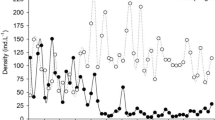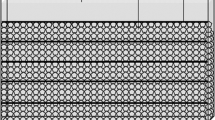Abstract
Rotifers inhabiting the sediment surface and the hyporheic interstitial of a gravel stream were investigated between October 1991 and October 1992. At the sediment surface, samples were taken with a modified Hess sampler at five randomly chosen sites and at roughly weekly intervals. In the hyporheic interstitial, samples were collected using standpipe traps permanently installed at two sites at four sediment depths (0–40 cm), and every fifteen days. The distribution of five rotifer species revealed different temporal and spatial patterns. Two species, Notholca foliacea (Ehrb.) and Notholca squamula (O.F.M.) co-occurred having their temporal peaks at the beginning of summer and in autumn. Cephalodella gibba (Ehrb.) and Proales theodora (Gosse) occurred throughout the year, while Parencentrum longipes (Wulf.) showed a clear peak during the spring only in the hyporheic interstitial. The effect of variables such as water level, surface discharge and variation of the groundwater level was tested upon the densities of each species. Despite the spring spate, the species are able to persist due to the presence of low-flow refuge habitats or the dispersion into deeper layer of the hyporheic interstitial.
Similar content being viewed by others
References
Boulton, A. J., H. M. Valett & S. G. Fischer, 1992. Spatial distribution and taxonomic composition of the hyporheos of several Sonoran Desert streams. Arch. Hydrobiol. 125: 37–61.
Braoini, M. G. & M. Gottardi, 1979. I Rotiferi dell'Adige: Confronto tra il popolamento interstiziale e quello bentico-perifitico. Boll. Museo Civ. St. Nat. Verona 6: 187–219.
Bretschko, G., 1991. The limnology of a low order alpine gravel stream (Ritrodat-Lunz study area, Austria). Verh. int. Ver. Limnol. 24: 1908–1912.
Bretschko, G. & W. Klemens, 1986: Quantitative methods and aspects in the study of the interstitial fauna of running waters. Stygologia 2: 279–316.
Burger, A., 1948. Studies on the moss dwelling bdelloids (Rotfera) of Eastern Massachusetts. Trans. am. microsc. Soc. 57: 111–142.
Donner, J., 1964. Die Rotatorien-Synusien submerser Makrophyten der Donau bei Wien und mehrerer Alpenbäche. Arch. Hydrobiol. Suppl. 27: 227–324.
Donner, J., 1970. Die Rädertierbestände submerser Moose der Salzach und anderer Wasser-Biotope des Flussgebietes. Arch. Hydrobiol. Suppl. 34: 109–254.
Donner, J., 1972. Die Rädertierbestände submerser Moose und weiterer Merotope im Bereich der Staueräume der Donau and der deutsch-österreichischen Landesgrenze. Arch. Hydrobiol. Suppl. 36: 109–254.
Donner, J., 1975. Seltene und auffallende Sessile und Notomatidae Rotatorien aus dem Schilfgürtel des Neusiedler Sees. Sitz.-Ber. Österr. Akad. Wiss.Math.-Naturw. Kl., Abt. I 183 (4–7): 131–148.
Evans, W. A., 1984. Seasonal abundances of the psammic rotifers of a physically controlled stream. Hydrobiologia 108: 105–114.
Kasimir, G. Microbial biomass and activities in a second order mountain brook. 5th International Worshop on the Measurement of Microbial Activities in the Carbon Cycle in Aquatic Environments, University of Copenhagen, Denmark. (in press)
Krebs, C. J., 1989. Ecological Methodology. Harper & Row Publishers, New York.
Madalinsky, K., 1961. Moss dwelling Rotifers of Tatra streams. Pol. Arch. Hydrobiol. 9: 243–263.
Moser, H., 1992. Oberflächeneintrag and Verfrachtung organischer Substanzen bei einem Gebirgsbach. Ph.D. Thesis Vienna University, 137 pp.
Palmer, M. A., 1991. Temporal and spatial dynamics of meiofauna within the hyporheic zone of Goose Creek, Virginia. J. N. Am. Benthol. Soc. 9: 17–25.
Palmer, M. A., A. E. Bely & K. E. Berg, 1992a. Response of invertebrates to lotic disturbance: a test of the hyporheic refuge hypothesis. Oecologia 89: 182–194.
Palmer, M. A., P. Arensburger & A. P. Martin, 1992b. The role of patch dynamics in explaining the population persistence of hyporheic biota: a numerical simulation model. In J. A. Stanford & J. J. Simons (eds), Proceedings of the First International Conference on Groundwater Ecology. Am. Wat. Ressour. Ass. Maryland: 119–131.
Panek, K. L. J., 1991. Dispersiondynamik des zoobenthos in den bettsedimenten eines gebirgsbaches. Ph.D. thesis University of Vienna, 190 pp.
Pawlowski, L. K., 1958. Wroti(Rotatoria)rzeki Grabi. Czesc I Faunistyczna. Lodzkie Tow. Nauk. Sectio. III. 50: 1–442.
Schmid, P. E., 1994. Is prey selectivity by predatory Chironomidae a random process. Verh. int. Ver. Limnol. 25: 1656–1660.
Schmid-Araya, J. M., 1993a. Benthic Rotifers inhabiting the bed sediments of a mountain gravel stream. J. Biol. Stn. Lunz 14: 75–101.
Schmid-Araya, J. M., 1993b. Spatial distribution and population dynamics of a benthic rotifer, Embata laticeps (Murray) (Rotifera, Bdelloidea) in the bed sediments of a gravel brook. Freshwat. Biol. 30: 395–408.
Schmid-Araya, J. M., 1994a. Spatial and temporal distribution of micro-meiofaunal groups in an alpine gravel stream. Verh. int. Ver. Limnol. 25: 1649–1655.
Schmid-Araya, J. M., 1994b. The temporal and spatial distribution of benthic microfauna in the bed sediments of a gravel stream. Limnol. Oceanogr. 39: 1813–1821.
Schmid-Araya, J. M., 1994c. Temporal and spatial dynamics of meiofaunal assemblages in the hyporheic interstitial of a gravel stream. Proceedings of the International Conference on Groundwater/Surface water Ecotones, Lyon, France. Cambridge University Press (in press).
Schwank, K. P., 1988. Differentiation of the coenoses of Helminthes and Annelida in exposed lotic microhabitats in mountain streams. Arch. Hydrobiol. 193: 535–543.
Schwoerbel, J., 1965. Bemerkungen über die interstitielle hyporheische Fauna einiger Bäche der südlichen Vogesen. Vie Milieu 1C: 475–485.
Sedell, J. R., G. H. Reeves, R. F. Hauer, J. A. Stanford & P. Hawkins, 1990. Role of refugia in recovery from disturbances: modern fragmented and disconnected rivers systems. Envir. Mgmt 14: 711–724.
Williams, D. D., 1984. The hyporheic zone as habitat for aquatic insects and associated arthropods. In V. H. Resh & D. M. Rosenberg (eds), The Ecology of Aquatic Insects. Praeger Publishing Company, New York: 430–455.
Williams, D. D. & H. B. N. Hyness, 1974. The occurrence of benthos deep in the substratum of a stream. Freshwat. Biol. 4: 233–256.
Wulfert, K., 1936. Beiträge zur Kenntnis der Rädertierfauna Deutschlands. Teil II. Arch. Hydrobiol. 30: 401–437.
Zullini, A. & C. Ricci, 1980. Bdelloid rotifers and nematodes in a small Italian stream. - Freshwat. Biol. 10: 62–72.
Author information
Authors and Affiliations
Rights and permissions
About this article
Cite this article
Schmid-Araya, J.M. Disturbance and population dynamics of rotifers in bed sediments. Hydrobiologia 313, 279–290 (1995). https://doi.org/10.1007/BF00025960
Issue Date:
DOI: https://doi.org/10.1007/BF00025960




